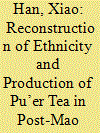|
|
|
Sort Order |
|
|
|
Items / Page
|
|
|
|
|
|
|
| Srl | Item |
| 1 |
ID:
178894


|
|
|
|
|
| Summary/Abstract |
Militaries are sustained by public money that is diverted away from other domestic ends. How the public react to the “guns-versus-butter” trade-off is thus an important question in understanding the microfoundations of Chinese military power. However, there are few studies on public attitudes towards military spending in China, whose rising power has been a grave concern to many policymakers around the world. We fielded a national online survey to investigate the nature of public support for military spending in China. We find that Chinese citizens support military spending in the abstract, but their support diminishes when considered alongside other domestic spending priorities. We also find that public support for military spending coexists surprisingly with anti-war sentiments and a significant strain of isolationism. In addition, while the conventional wisdom suggests that nationalism moves a state towards bellicosity and war, we find that Chinese citizens with a stronger sense of national pride report stronger anti-war sentiments than other citizens.
|
|
|
|
|
|
|
|
|
|
|
|
|
|
|
|
| 2 |
ID:
182980


|
|
|
|
|
| Summary/Abstract |
This article examines a humorous meme that emerged on Chinese TikTok during the COVID-19 pandemic in China. Using #workfromhomewithchildcare, Chinese working mothers shared humorous clips of their experience of working from home with their children who were also at home during the pandemic lockdown. By analysing the themes, protagonists, and humour techniques of a sample of 85 videos, we ask why the mood of these clips is so strongly marked by humour, and what this tells us about contemporary Chinese society, particularly about the position of women and mothers. We show that these memetic clips consist of three distinct genres of mothers working from home: (1) ‘balancing mothers’ who balance between work and childcare, (2) ‘pedagogic mothers’ who give childcare tips, and (3) ‘commercially oriented’ mothers who offer tutorials by means of product placement and advertisement. While these memes express what Mary Douglas called ‘a joke in the social structure’ without offering either relief or critique, they do create an online joking culture that offers temporary relief as well as awareness that others are in the same position. Our analysis tempers enthusiastic claims about both the critical potential of humour and the new ‘liberating’ affordances offered by digital platforms to produce liberating female spaces.
|
|
|
|
|
|
|
|
|
|
|
|
|
|
|
|
| 3 |
ID:
192328


|
|
|
|
|
| Summary/Abstract |
This paper explores the effect of digital finance adoption on women's bargaining power within the family. Empirical analysis finds that higher digital finance adoption significantly improves women's bargaining power and thus alleviates intra-household inequality. We explain the underlying mechanism in terms of women's participation in both labor and financial market. The subsample regression results show that the impact differs among families with distinct characteristics in terms of regions, family living patterns and women's fertility status. This paper provides a new perspective for understanding the inclusive contribution of digital finance and forms a timely complement to the literature in related fields.
|
|
|
|
|
|
|
|
|
|
|
|
|
|
|
|
| 4 |
ID:
190308


|
|
|
|
|
| Summary/Abstract |
In post-Mao China, the Bulang ethnic group in Yunnan province use Pu’er tea cultivation as a primary way of reconstructing their ethnic identities and cultural traditions. In this paper, I argue that in the process of ethnicization, material culture is a critical factor in addition to myth, history, religions, and cultures, rooted in a historical process of forming ethnic identities, based on a six-month participant observation in Mangjing Village with local tea farmers. I further argue that the Bulang people’s reconstruction of ethnicity can be seen as an incorporation between the majority (state power) and the minority (ethnic people in frontiers) and is constituted by both external and internal factors. I also highlight that Pu’er tea functions as a particularly meaningful material agency when looking at how the Bulang people in Mangjing proactively respond to state power manipulation, mobilize social relations, and engage with a larger commercial market in the modern world.
|
|
|
|
|
|
|
|
|
|
|
|
|
|
|
|
|
|
|
|
|